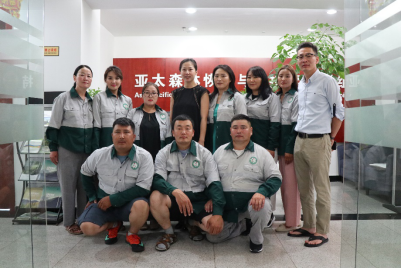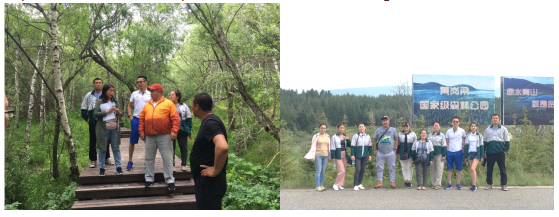A Mongolian delegation visited China’s national parks and learned from their experiences – putting people first in national park management
To draw from China’s experiences on national park management and exchange ideas on how to address challenges facing these parks, a ten-person delegation from the National Garden Park of Mongolia visited China from 23 to 29 June 2019. They visited the APFNet Secretariat, three national parks (one in Beijing) and the APFNet multi-functional forest experience based in Chifeng, Inner Mongolia.

The Mongolian delegation visited the APFNet Secretariat.
The delegation and park managers exchanged ideas on park management policies and supporting systems, particularly their ideas on addressing challenges. These included but were not limited to a lack of scientific inventory of natural resources, the slow development of protected areas, pressures from overly developed tourism, untreated wastewater problems and conflicts between local communities and park managers. Nursery cultivation and seedling survival improvement were also of particular concern for the delegation.

Visit to Huanggangliang National Forest Park.
Mr Chen Wanming, Director of the Huanggangliang Forest Farm, introduced the delegation to the Park and highlighted various benefits for locals in national park development. “It is important to engage with local communities and let them benefit from the changing conservation landscape,” he said.
Similarly, the delegation also provided details on the Mongolia National Garden Park as a city park that aims to preserve the watershed area and provide natural green areas to retain the beauty of the city as well as provide a comfortable environment for urban dwellers. “Putting people first also applies to our park,” Mr G. Uyanga, the head of the delegation indicated.
Overall, while urban and rural national parks face different challenges, all parties were able to bring important insights back to their economies. One of these insights is that China’s national parks optimize ecological conservation and public welfare, especially in response to large population pressures on fragile ecosystems.
The National Garden Park of Mongolia is the partner of the “Construction of a Mini Botanic Park of 8.4 hectares within the National Garden Park of Mongolia” project, sponsored by APFNet. The project has created an 8.4-hectare mini botanic park within the National Garden Park in Ulaanbaatar by planting a combination of tree species, bushes, flowers and grasses and establishing facilities such as a water area, water pavilion, roads, lighting and so forth for Ulaanbaatar citizens.
Similarly, the delegation also provided details on the Mongolia National Garden Park as a city park that aims to preserve the watershed area and provide natural green areas to retain the beauty of the city as well as provide a comfortable environment for urban dwellers. “Putting people first also applies to our park,” Mr G. Uyanga, the head of the delegation indicated.
Overall, while urban and rural national parks face different challenges, all parties were able to bring important insights back to their economies. One of these insights is that China’s national parks optimize ecological conservation and public welfare, especially in response to large population pressures on fragile ecosystems.
The National Garden Park of Mongolia is the partner of the “Construction of a Mini Botanic Park of 8.4 hectares within the National Garden Park of Mongolia” project, sponsored by APFNet. The project has created an 8.4-hectare mini botanic park within the National Garden Park in Ulaanbaatar by planting a combination of tree species, bushes, flowers and grasses and establishing facilities such as a water area, water pavilion, roads, lighting and so forth for Ulaanbaatar citizens.



